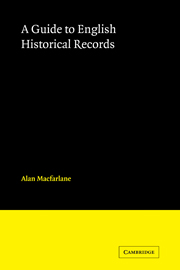1 - Re-discovering the English past
Published online by Cambridge University Press: 07 October 2011
Summary
This introduction is designed to help those who wish to re-discover a world which survived for over five hundred years but is now rapidly vanishing. We speak of ‘re-discover’ for a number of changes in the last fifty years are making that world seem strange and alien, a ‘world we have lost’ in the title of Peter Laslett's well-known book (Laslett 1965). This distancing is partly the result of technological change. As Marc Bloch observed: ‘successive technological revolutions have immeasurably widened the psychological gap between generations. With some reason, perhaps, the man of the age of electricity and of the airplane feels himself far removed from his ancestors’ (Bloch 1954:36). Since Bloch wrote, the pace has quickened and we now have television, computing, nuclear weapons and a host of other technological gulfs. The difficulties in understanding are also increasing rapidly as a result of recent attempts to bring England into the European community. The measures of weight, distance, length, the principles and institutions of law and government which were built up over a thousand years have been or are being rapidly swept away. Old county boundaries and old communication systems are being changed. Alongside these changes is a re-shaping of the physical landscape. During the last thirty years, many of the houses, roads, hedgerows, woods and fields have been destroyed, old town centres have been pulled down, ancient landscapes cut in half by motorways.
The difficulties in studying English history over the five hundred or so years up to 1800 were considerable enough even by the later nineteenth century. Often it was necessary to uncover modes of thought which were almost gone.
- Type
- Chapter
- Information
- English Historical Records , pp. 1 - 12Publisher: Cambridge University PressPrint publication year: 1983



